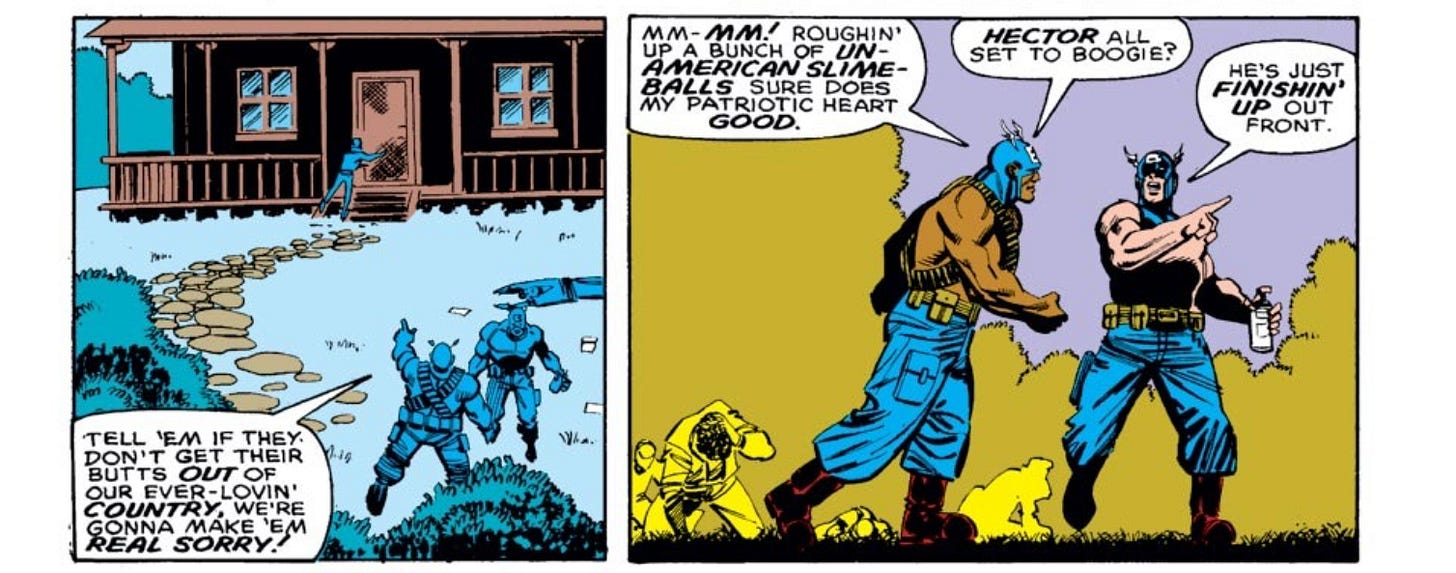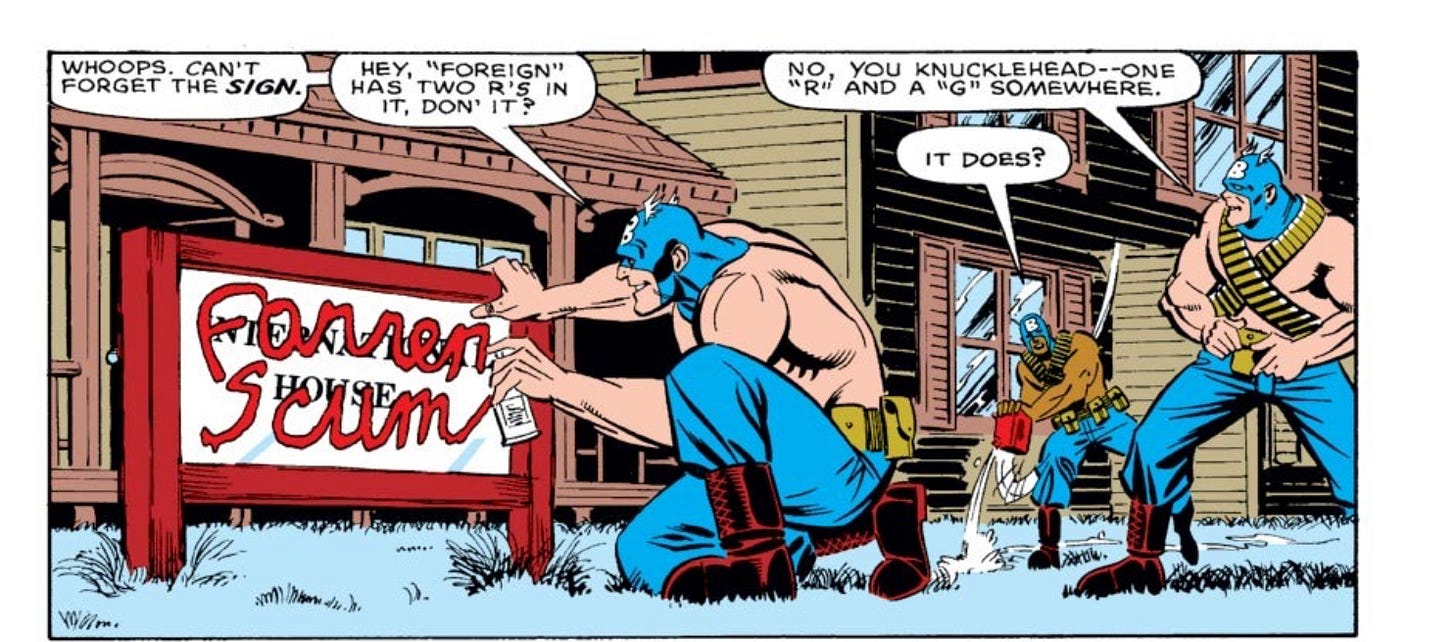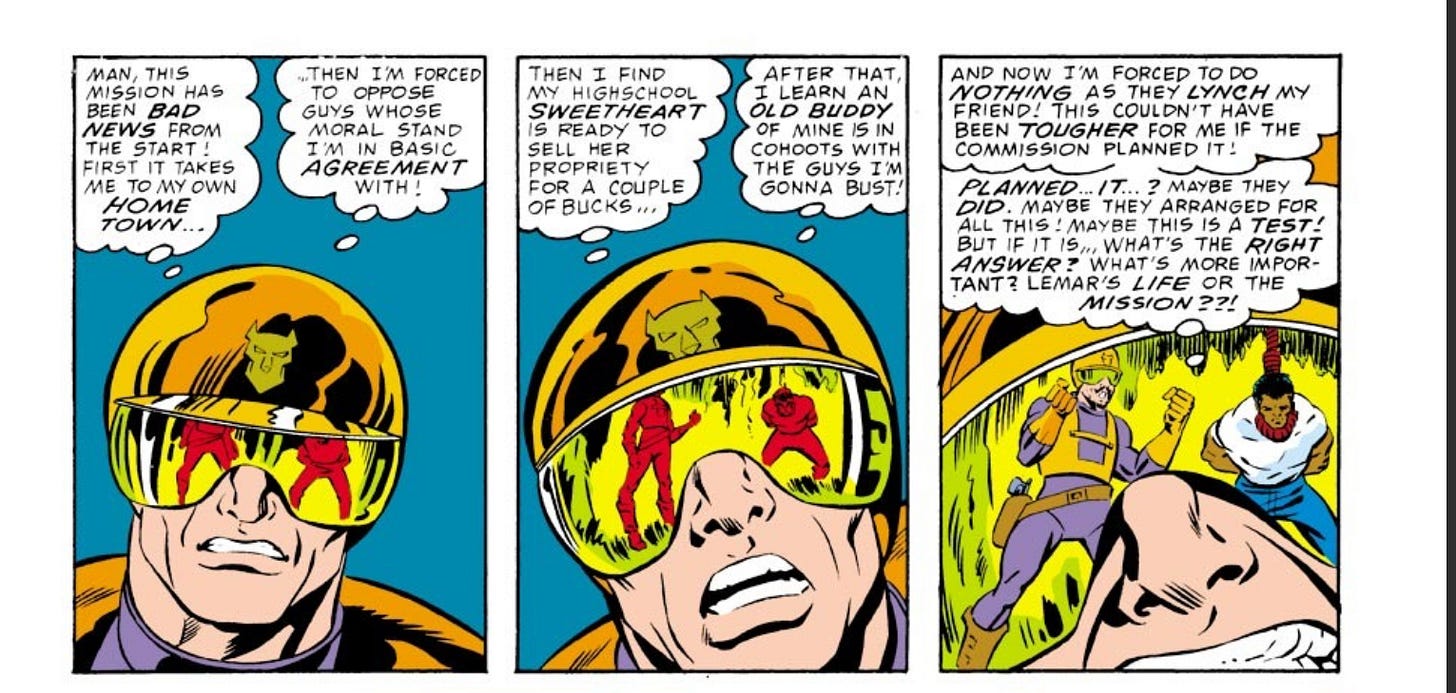John Walker, The MAGA Captain America From The 1980s
Go see ‘Thunderbolts*’
The MCU’s latest entry, Thunderbolts*, features former Captain America John Walker (Wyatt Russell), now known as the U.S. Agent. The late and much-missed Mark Gruenwald created the character during his decade-long run on Marvel’s Captain America comic. Introduced in 1986, toward the end of Ronald Reagan’s presidency, the aggressive and conservative Walker was a deliberate contrast to the more traditional and liberal Steve Rogers.
Gruenwald believed it was important that Captain America’s foes and even his foils are thematically specific to a hero who symbolizes the American dream. As he said, “Spider-Man does not represent spiders. Spider-Man’s a guy who happens to have spider powers. He can fight anybody … A Captain America story should always have this symbolic level or he becomes generic. Captain America’s best villain has always been Red Skull. Why? Because he is the flip side of the ideological coin that Captain America is on, tyranny versus freedom.”
The MCU’s John Walker first appears in 2021’s The Falcon and The Winter Soldier, where the major villains are the Flag Smashers, a twist on a Captain America foe from the comics who Gruenwald designed as his “anti-patriot” opposite — someone “totally against the concept of countries and nationalism.” The MCU version is not a single person but a terrorist group of super soldiers led by Karli Morgenthau (Erin Kellyman). These anti-nationalists demand “open borders.” Reshoots might’ve deliberately weakened this premise, which is not fully explored in the series.
Unfortunately, the MCU has consistently bowdlerized Captain America’s foes, removing any hint of political commentary that might threaten international box office. Cap’s greatest enemy, the Red Skull, is no longer a Nazi with a stated ideology of white supremacy. Nor is Baron Zemo, whose MCU counterpart is far more sympathetic (he even appreciates Marvin Gaye). The Serpent Society was Gruenwald’s riff on trade unions — a concept that led to some of my favorite stories — but in the MCU, the group is a barely snake-themed criminal organization for hire.
The MCU’s John Walker is no exception. Although he replaces Steve Rogers in TFATWS, he never actually meets the original Captain America. Walker is more a foil to the true successor, Sam Wilson (Anthony Mackie), and their conflict lacks the Gruenwald storyline’s complexity and political relevance. (Watch below.)
The comic book John Walker first appears in the guise of “Super Patriot,” and he actively seeks to replace Steve Rogers as the “living symbol of America.” While the MCU Walker was a decorated combat veteran before his selection as the next Captain America, the comic book version is a shameless self-promoter who travels the nation holding rallies that are less patriotic than they are jingoistic. He also pals around with far-right goons dubbed “bold urban commandos” or “BUCkies” like Cap’s former partner Bucky Barnes. They are costumed Proud Boys who harass international college students they baselessly claim are spies for Muammar Gaddafi. They deface the students’ residence with the words “foreign scum” (they, of course, misspell “foreign”).
Steve Rogers is believed dead (or on the moon) in the MCU when Walker replaces him, and Walker speaks about his predecessor in interviews with genuine respect. In the comics, Rogers is still active as Cap, but Walker considers him “outdated” and behind the times, openly disparaging him at his proto-MAGA rallies. He declares, “Someday there is going to be a reckoning and I’ll prove to the world that I’d make a better symbol of America than him.”
This reckoning extends beyond the comic book panels. In the 1980s, many fans demanded that superheroes behave more like the action heroes Sylvester Stallone and Arnold Schwarzenegger played on film. By this point, characters like Green Arrow and even Batman to a degree had become “grim and gritty,” but Captain America could never become Rambo — at least not with Steve Rogers holding the shield.
On the surface, the conflict between Rogers and Walker was over who best represented American ideals in the 1980s, but on another level, this also played out as a debate over how conservatism was truly defined during the Reagan era. Steve Rogers in both the comics and the MCU exudes the idealized conservative traits of honor, loyalty, and duty. Like Superman, he is often described as a “Boy Scout.” However, despite decades of right-wing PR, liberals also possess these traits. Rogers is compassionate, secure in his beliefs while respectful of others.
Walker’s brand of conservatism, though, would soon dominate the Republican Party. He would’ve proudly worn the red MAGA cap and endorsed Donald Trump, while Rogers would have remained impartial. His liberalism was also anchored by perhaps an undue fealty to institutions. This is a weakness that the true villain behind the scenes (surprise, it’s the Red Skull) would exploit when Captain America is ordered to serve as an official operative of the U.S. government.
“I cannot represent the American government; the president must do that,” Roger says. “I must represent the American people. I represent the American dream, the freedom to strive to become all that you can dream of being. Being Captain America has been my American dream.
“To become what you want me to be, I would have to compromise that dream … abandon what I have come to stand for … I am sorry but that’s the way it must be. Gentlemen, I believe these are yours.”
Rogers surrenders his costume, shield, and very identity to the government. Later, he’ll wonder why he was defeated so easily. He was reluctant to challenge the government in court, believing he should respect the will of the people even though the shadowy government commission is not truly acting on behalf of the American people.
Gruenwald quickly establishes that John Walker is not fit to serve as Captain America. The signs are subtle at first. He abandons his former “bold urban commando” friends Hector and Jerome who are PR liabilities. In an early assignment, he infiltrates the far-right vigilante group, the Watchdogs, who, like Walker, oppose pornography, sex education, and abortion. When the Watchdogs capture his Black partner, Lemar, and are about to lynch him. Walker actually struggles with whether to break his cover and defend Leland against people whose extremist views he shares.
Walker eventually does the right thing and takes down the Watchdogs. However, later his spurned friends, now going by the hardly subtle code names Left Winger and Right Winger, expose his identity to the public. This petty act of spite helps the Watchdogs engineer a devastating revenge: They kidnap Walker’s doting parents as bait for their trap, and while Walker fights the Watchdogs, his parents are fatally shot in the crossfire. This completely cracks Walker, who brutally murders the Watchdogs, and in a chilling closing scene, speaks lovingly to his parents’ corpses as if they were alive.
The next issue is even more shocking, as the man in Captain America’s uniform goes full Rambo on Hector and Jerome. He warns each of their mothers that their son is a “dead man.” When they confront him, Walker savagely beats them, strings them up … and sets them on fire.
Gruenwald gave readers a truly “grim and gritty” Cap, and the result is terrifying. John Walker — a deranged killer — would remain Captain America for another few issues before Steve Rogers triumphantly reclaims the title. By this point, Walker is little more than a drooling madman.
The MCU’s Walker is provided a more plausible path to redemption. He fails to live up to either Steve Rogers or Sam Wilson’s standards, but he doesn’t become a monster. After Karli murders Walker’s partner and best friend, Lemar, Walker chases down one of her accomplices and bludgeons him to death with his shield. The image of Cap’s bloodstained shield goes viral and the government swiftly fires Walker. This is perhaps less realistic than super soldiers, though, as actual cops have killed fleeing suspects and easily kept their jobs. Fox News would celebrate a Captain America who executed a terrorist. (Watch below.)
Ultimately, Mark Gruenwald and the MCU had very different plans for John Walker. Walker in the MCU is more like DC’s Guy Gardner, who Nathan Fillion plays in James Gunn’s upcoming Superman movie. This Walker’s an “asshole,” but he’s a decent person who wants to help other people, even when the cameras aren’t rolling. Gruenwald’s Walker is a simmering fascist who believes might makes right. His version of America is exclusive, ideologically homogenous, and tragically all too real. Gruenwald died in 1996 at 43. It’s terribly unfair that he never lived to see his stories and characters adapted to the screen, but we should remember how daring and sadly prescient his work remains.












>> Reshoots might’ve deliberately weakened this premise, which is not fully explored in the series.
Lol no shade, but that’s a hell of an understatement!
TBH that was the moment the MCU jumped the shark for me. They couldn’t coherently explain where all this stuff was coming from and exactly what the hell was happening in the post-Blip world; they just charged right in to the politics. I’m not asking for Shakespeare’s histories here, but five minutes of solid exposition sprinkled throughout the first couple episodes of that show really would’ve saved the whole endeavor.
It’s funny.
First Blood remains a very strong antiwar movie that indicts the government for utterly failing veterans. John Rambo is a tragic figure. Someone who went over when his government called and did things he was ordered to do that haunt him. He is abandoned when he comes home. He is homeless. He suffers from PTSD. He doesn’t know how to reintegrate into a peace time society. When he is abused, he snaps and returns to what he does best. I’ve read that in the source material, his former CO is less interested in helping John Rambo than in cleaning up and covering up the mess Rambo causes.
Of course, we couldn’t have a tragic figure. It was “morning in America”. So in the very next movie, he becomes a gung ho super soldier. All of the antiwar stuff is gone. Violence is the answer.
We will briefly note that the “heroes” Rambo helps by killing a lot of Russians in the third movie become the enemies of the 2000’s. I suppose one could spin Rambo 3 then as an inadvertent return to the antiwar message of the first one.
But that was the 80’s pop culture.
The “bad guys” (mostly Black and brown skinned people) were threatening “good, decent” (read: White) Americans and only one (White) man with a gun could possibly stop them and “save America (Western Civilization). The Constitution was just a piece of paper that evil lawyers were using to exonerate those bad guys who were obviously guilty or the cops wouldn’t arrest them.
Now, I’d like to think most of us kids exposed to that horsesht grew out of that phase as we became adults. But it’s pretty obvious that more than half of us white kids are still stuck in that childhood phase of the 1980’s where we cheered the (white) cop no matter how murderous or brutal he became against the “bad guys” and the law, lawyers, and Constitution were just bullshit to shield “bad guys”.
Captain America and Superman are a call to an idealized America. An America at our best. They don't really fit the current decade.
I'd be curious to see how the next Superman movie handles this. Superman is generally the very definition of power under the control of compassion and empathy.